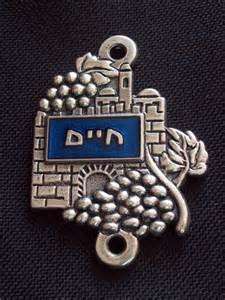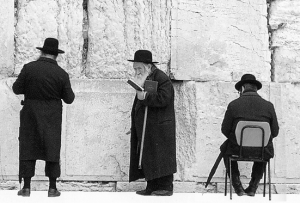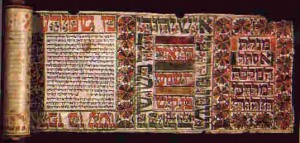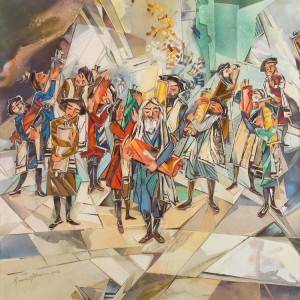 It could be anyone. A friend, a relative, a boss, or even a rabbi.
It could be anyone. A friend, a relative, a boss, or even a rabbi.
A person that you trust that over steps the boundaries of normalcy – entering the domain of abuse.
The trust factor is an important part of the abuse. For if a stranger tried something similar, a red flag would go up immediately. But now that this person is trusted, your guards are lowered.
Many a time a victim will not recognize that the acts are abuse until they are steeped into it. But by that time they are confused what to do. On one hand this person is abusing them. On the other hand they are left with the question “Should I report someone whom I trust so much?” There is also an element of fear in abuse. The abuser at times uses real or veiled threats or creates fear in the victim so that they will not escape the web they wove.
A friendly hug. A nice word about one’s clothing. A small threat. Are they a misnomer or the beginning of the abuser’s approach – testing the waters before they go further.
The process of abuse is similar to the tactics that cults and missionaries use. Or people who eventually become abusive spouses. First they lure them with their honey, and then they draw the blood from them.
Although each case is different, here is a general outline on the process of abuse:
1. Desire by the Abuser of Control or Power – The abuser has a need for power. The power might be control of an organization or of a person. This need for power can manifest itself in the abuser doing all kinds of immoral things under the rug. They might insult others, undermine other’s power, speak badly of others, touch others inappropriately, use manipulation techniques.
Abusers sometimes make a common enemy so that the blame is placed upon the enemy and removes the blame from themselves. Sometimes the abuser will use their position of power to be a “protector” against the “enemy” in order to “protect” the victim. In this way the victim will focus on overcoming the enemy rather than on the abuse of the abuser.
2. Interest – the abuser’s main goal to achieve is to advance his or her cause. They are the center of attention. They may want to take over an organization, gratify their desires or be the leader.
3. Stealth – Most of the time the victim is unaware of the plan of the abuser. The abusers acts can be dormant for many months until they learn about the victim’s vulnerabilities. When they know them well and have established trust they strike. They hide their acts from the public or others.
4. Bulldozer Attitude – the abuser is usually so self centered that anything that gets in their way, they will trample over. They have no intention to back down, even when they back down. They back down at times to keep the victim hooked. This is why reasoning with them or giving to them moral reasons to back down will not sway them. Their agenda is most important – anything you say or do will not sway them – unless it has to do with their interests – meaning – you cannot say “it is not right what you are doing” you have to stop them by saying “either stop or i call the police” or “i will report you to the boss about what you are doing.”
5. Selecting the victim(s) – The abuser chooses their victim by seeing who is must likely to cave-in to their abuse. Those that are savvy in recognizing abuse or strong or may report their abuse – they avoid. They tend to go after the naive.
6. Grooming – This is the period in which the actor (in legalese) establishes trust with the victim. It could be through nice words, giving gifts, establishing commonalities together, talking about another’s personal life, offering personal support or teaching. The grooming process hooks the victim.
7. Search for vulnerabilities – As the abuser gets to know the victim or his support group or camp, the abuser examines their mind set. He or she sees what they will respond to. Is it appreciation? Emotional Support? Financial Support? Threats? Blackmail? Anything goes.
8. Creating Quarrel / Establishment and Disparagement of Enemies – To make a cause for themselves the abuser tries to make remove the focus of the bad that they are doing by establishing an “enemy” so victims will focus on the “enemy” rather than on the abusive acts of the abuser. He or she will speak badly about them, do things against that person for they think that the other is the enemy, when the real enemy is their own “evil inclination.”
9. Establishment of Camps – abusers see themselves as the focal point. They stop not from doing the improper, under the rug, even if it means hurting others. They build up a support group to assure they are “in the right.” They will use flattery, offering gifts, parties to win people over to their camp.
10. Establishment of Fear – the actor will use their power or power of words to neutralize their victim from acting out or talking against them. They might use their power to fire them, scaring people by speaking of spiritual punishment of people who went against them, physical violence or anything else they can get their hands on. The fear instilled keeps the victim trapped.
11. Mind Games – The abuser makes the victim and others feel that it is the abuser who is a victim. When confronted with their improper acts, the abuser denies them. They make the victim feel like the abuse is coming to them – they pass the message “if they (the victim) were good, they wouldn’t be abused.” They make the victim feel guilty to pull out of the abusive relationship.
The abuser plays the victim and convinces others that they are being unfairly treated. Someone did something bad against them and now they have the right to act the way they do.
They create the feeling in followers and victims that both of them are interested in the outcome – that the abuser should retain his power. “This is a fight for Torah.” “We have to overcome this situation together” “Say that it is mutual.”
The abuser has many weapons at his side. They include flattery, compliments, gifts, veiled threats and a golden tongue.
12. Protest from People who have victim’s real interests in Mind – In everyday conversation with family members and spouses, information sometimes leaks about the abuse process. They might naively tell there spouse “The boss said that he missed me.” “the Boss showered me with personal compliments.” “The boss wrote me personal notes.” Some of the close ones will catch on to the impropriety of remarks or acts. They will protest, “that is not correct.” “This person is over stepping boundaries.” The victim, usually ignores these comments, because they are either already caught in the abuser’s web or they are biased from being part of the abusive relationship.
13. Selecting the proper moment to start abuse process – The abuser knows that he or she cannot commit their abusive acts in the open. They usually choose a time where they are alone with the victim to start. Perhaps on a good day that they had together or when the victim is emotionally vulnerable.
14. Breaking of Boundaries – Many who were not subjects of abuse do not understand how could this have happened. It is not that the victim said, let me be abused, or let me marry this abusive person, or wanted to be harassed. The victim was naive. He or she put their trust in an individual, with no thought that the other had bad intentions. The unsuspecting victim is knocked into different corners of the pool table by the abuser’s flattery or golden tongue until the person is exactly where abuser wants them.
So they test the waters – abusers start a bit of breaking the boundaries. The boss says to the employee “I love that perfume, where can I get it for my wife?” The boss enters into the personal life of the secretary, to help her how he can. The boss uses the word we. Like “after all that work, we need a vacation.” He calls her by her first name. He sends her a personal note about her beautiful work. He directs his comments to compliments her instead of her work. He says “G-d Blessed you with so much.” He talks about his private life to her. He says I missed you when you were away.
All signs of breaking boundaries.
15. Abuse – After testing the waters the abuser starts either harassment – through touching, or forcing the person to do things against the law, or talking badly
16. Nurturing the Relationship – The abuser continues his or her relationship by continuing the grooming process.
17. Injecting Guilt – The victim sometimes gets moments of clarity and realizes the abuse. When the victim confronts the abuser, they put on an act to make the victim feel guilty. They may cry or say they will leave or they will use guilt tactics.
18. Denial of Doing wrong – Just like the abuser convinces others that they do no wrong, sometimes they even convince themselves that they are entirely innocent regarding the abuse they commit. They say “it is mutual.” or “It is my company.”
19. Covering Up – The abuser tell the victim, “please cover for me” or do not tell anyone what we said, it is confidential.
Types of Abusers
Various types of abusers include:
Bully – A bully uses their power of force, fear or threats to get what they want.
Perpetrator – One who has committed abuse.
Predator – One who has a carefully though out plan to commit abuse – usually sexual abuse.
Stalker – One who awaits others in order to abuse them.
Sexual Harasser – One who uses inappropriate words to harass a person.
Sexual Abuser – A person that physically abuses another by means of touching.
Rodef / Pursuer – One who has the intention of killing or raping another. According to Jewish Law – one is allowed to kill a rodef / pursuer or a safek rodef – a person who you think has a serious intention to rape or kill.
Recognizing Red Flags of Abuse
If you are reluctant, embarrassed, afraid to tell others what someone else did or said – because of the consequences, regardless of what they might be – this is a red flag for recognizing abuse. If you feel you are hiding something from your parents, or your spouse of something that someone did to you it is highly suggested you talk it over with them.
If you see that others do things that are illegal or they try to hide, this is a sign of abuse
In causal conversation with others, if someone says to you “that that that person said to you was a bit off.” or “that that she said to you was a bit too personal.” or if you notice the person talking about your body like “I love that beauty mark you have.” are all red flags and strong action must be taken immediately before it escalates further.
Recognize what is normal and not normal. What is healthy work relationship or an abusive one. Compare them to your present work environment.
General advice
– Never confide in someone that is relatively a stranger more than someone that you have trusted for years.
– Read the book “9 to 5 – modesty in the workplace” by Rabbi Neiman to recognize what is normal conduct in the workplace.
– Avoid personal questions, advice, getting support from members of the opposite gender.
– listen to the way that the person acts or speaks in general. Observe unusual things about them. Like they talk only about themselves, or may do off acts.
– Warn children about the process of abuse – that no one should touch their bodies. They should not stay alone with others. They should have a “sharing buddy” that they can tell anything to and that buddy will let parents know if there is anything unusual.
– Do tell – be open with your siblings, spouse, parents, other people that you trust to hear what they think of the other persons questionable acts
– if you want to hide something – will And tell others. Many a time others can help you prevent being abused – but if they don’t know about it they can’t help you.
– Make a list of people you trust the most rank order
– don’t shrug off or be oblivious to comments of your spouse, or close relatives that sorry “this person is acting in appropriately.”
– Avoid being alone with the abuser and avoid contact with them. Find excuses to avoid contact “I’m sorry I’m very busy with the project to come to your office.”
– Listen to advice of your parents or spouse – “don’t speak with you. Don’t call him at home. Don’t text this person. Don’t talk too much with him. Don’t stay in the same room with him.” Ask them to define exactly what they mean. Ask them for specific guidelines.
– Don’t we can – if you recognize or know that you feel uncomfortable in the presence of the person let them know clearly not to commit the actions. Don’t mince words. Say stop what you’re doing is unacceptable. Instead of saying more neutral comments pushing them off.. Don’t remain silent in the face of the abuse.
– As the abuser uses emotions to manipulate the victim – he will use words or acts to flatter or cry or not to use to reestablish the relationship. Don’t weekend and go back.
– Ask yourself – “is this my responsibility”. If the person has certain emotional needs or physical needs or power needs ask yourself if it is your responsibility that his needs or her needs be fulfilled through your.
Breaking out of the web –
Pray to Hash-m that he helps you to escape this situation of abuse. Be very specific “Please Hash-m please stop this person from persuing and abusing me by having him promptly fired.”
Ask yourself “What do I have to gain by following this person?” Usually, you have little to gain. This was the wife’s advice to the follower of Korach – On Ben Peleth – in the Torah. His wife asked him “what do you gain by being part of the quarrel? in either case you will be secondary – if Moses is the Leader – you will be secondary to him. If Korach is the leader – you will also be secondary to him?” On be Peleth listened to his wife’s advice and was saved from being part of the quarrel and death.
Ask what do you have to lose if he doesn’t back down?
Tell others as soon as you recognize that one is breaking boundaries.
Recognize why you fear of not speaking against the other person, and weigh the advantages of speaking vs. not speaking. Many times the abuser acts in a way to gradually increase abuse in increments. That is why it must be stopped – very strongly – using no unclear terms like “You better stop or I will let the boss or my husband know” – once it is recognized. Even if he or she does stop, you should let the workplace or your trusted relatives know for them to decide a proper course of action.
Write a diary of things that happened. Show it to a trusted person and ask them what they think.
Who is at fault?
Many times the victim asks “why didn’t I stop the abuse?” they realize they were abused and feel guilty for not having stopped it or ask if they brought it upon themselves.
Psychologists say that the normal reaction to a fearful situation is either freeze, flight or flight. Either one will freeze in the face of abuse. Or they will fight it. Or they will run away. Knowing your common reactions to abuse and Practicing strong reactions that are effective in stopping the abuse is helpful.
The abuser usually has a golden tongue and heart of a snake. If you are someone who freezes or has very mild reactions to abuse, change your attitude to flight – get out of the abuser’s path ASAP because they usually have a bulldozer attitude – they have no intention to stop. Also take counsel with those who are specialists in abuse and trusted family members immediately to determine the best course of action.
Abusers are usually mostly at fault for their abuse because if they did not want to do it, they would have sought help from others, attended support groups or seen psychologists. At times the abuser has APD – Abusive Personality Disorder. It is a condition that is telltale of an abuser.
I read once an abuse victim who was an expert in Judo -who was emotionally powerless to defend themselves from the abuser because of the grooming process that took place beforehand.
Sometimes a person falls for a mate that turns out to be an abuser, because they were caught by the abusers golden tongue. The attitude of the trapped is, “He is so kind,”, “She speaks so nicely.” “I am in love.” Forget about love for now. The first and foremost priority is to find a mate that is acceptable according to Torah (ie, Jews marry Jews) and psychologically stable. Is it better to marry someone you “love” and be subjected to decades of degradation, yelling, physical violence, because you overlooked doing your homework because of “love.” If you think you should not do your homework, you are partly responsible for negligence.
Stopping the Abuse
A Previous Article spoke on Getting out of an Abusive Relationship. We will mention some here.
Tell a trusted person what the actor is doing. In general you should never have to hide anything from anyone – unless it is “Lashon HaRah” – Evil speech.
Tell the person to stop in strong terms or ask someone else to tell them in a strong way.
Tell the person that if they do not stop, you will tell others or summon them to “Beit Din” – a Jewish court of law.
If the person is an employess, tell your boss and someone you trust immediately upon when the person oversteps boundaries.
Mistakes in Lashon HaRah / Evil Speech.
In general one is never allowed according to Torah to speak badly about others even if it is 100% true what the person did. The exception is is if the words that you wish to say have cause a benefit / Toelet – you are allowed to say exactly what the person did. If you are in doubt of whether to saying anything is lashon harah, ask yourself, what benefit will anyone get – including myself by saying what I want to say. If you find one reason, you should talk. Sometimes remaining silent can be a sin, because you are not protecting yourself.
Remaining silent when someone asks you about a the character or deeds of perpetrator for a purpose – like whether to hire this person – one may be transgressing the commandment “Do not stand upon the blood of your neighbor.”
Some people who remain silent in the face of abuse do a great disservice to others, the community and the world. They think that they are protecting the abuser, but in the end they cause the abuser to go to different workplaces and commit the same abuse. A person should know the laws of lashon harah to know when or not to talk. If one does not talk they could be transgressing the commandment of “Do not stand by the blood of your fellow.” Thus if one is in doubt they should consult a competent orthodox rabbi or the Shemirat Halashon Hotline – a hotline that answers questions regarding when it is permissible to talk badly about others according to Jewish law.
Responsibility of Friends and Relatives
Friends don’t let friends drive drunk. Friends also don’t let friends fall into an abusive relationship. Sometimes people on the outside recognize the signs above better than those involved with a potential abuser. Seek proper strategies to separate the friend from the abuser.
After the Abuse
If someone was already abused, it makes sense to overcome it by speaking with a trustworthy and reputable therapist or psychologist that has a Torah hashkafa / Outlook from the Torah. Usually an orthodox Jewish therapist will have the proper Torah outlook.
Finding what to do with the abuser or if it was at the workplace – what to do to receive compensations. Making a settlement is the easiest, because it spares the victim from having to face the abuser or relive the trauma of the abuse.
The Torah also says don’t borrow money from others too much. Because perhaps their intention is to establish trust with you and then you will lend them and not return the money to you. Similar to abuse, they establish trust and then take the “money” from you.
The Torah teaches us of the proper attitude to take towards people – “Honor them, but suspect them.”
 This Post is Dedicated to the Sassoon Children who Perished in a Fire – LiIluy Nishamatam / for the Elevation of their Souls. May G-d console the mourners and all of those who share in their grieving.
This Post is Dedicated to the Sassoon Children who Perished in a Fire – LiIluy Nishamatam / for the Elevation of their Souls. May G-d console the mourners and all of those who share in their grieving.








